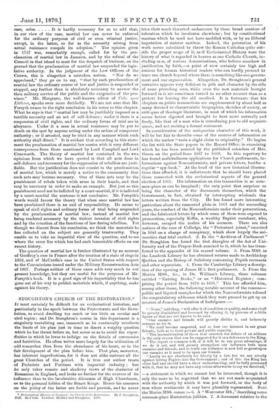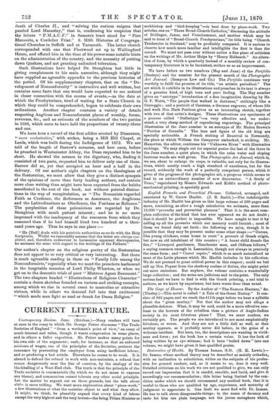STOUGHTON'S CHURCH. OF TLIE RESTORATION.* IT must certainly be difficult
for an ecclesiastical historian, and particularly in the epoch between the Protectorate and the Revo- lution, to avoid dwelling too much or too little on secular and civil topics ; and Dr. Stoughton's course in this department is a singularly tantalizing one, inasmuch as he continually recollects the limits of his plan just in time to desert a weighty question which he has thrust before us, but never so as to avoid the super- iluities in which he loves to indulge on the details of ceremonies and festivities. He often writes more largely for the utilization of -odd researches than from the abundance of his heart, or in the lair development of the plan before him. That plan, moreover, 'has inherent imperfections, for it does not alike embrace all the great Churches of the period. It is true our author treats of Prelatists and Puritans with impartial industry ; but he only takes remote and shadowy views of the character of Romanisin in England, and looks no further for the sources of its influence than to the lucubrative dilemmas of High Churchmen, or to the personal foibles of the Stuart Kings. Hence his censures on the policy of the latter are feeble and peevish, and he never * Ecclesiastical History of England: the Church of the Restoration. By J. Stoughton, D.D. In 2 cola. London: fodder and Stoughton. 1870.
tries their much thwarted endeavours by those broad maxims of toleration which he inculcates elsewhere ; but by constitutional maxims which he need not have meddled with, or by an illiberal imputation of sinister motives. Indeed, the peroration of his work seems calculated to throw the Roman Catholics quite out- side the proper scope of it, as if Ecclesiastical History were the history of what is regarded in heaven as one Catholic Church, in- cluding men, of various denominations, who believe somehow in justification by faith,—a point of view certainly too high and curious for human historical readers who can hardly pretend to trace one church beyond where there is something like one govern- ment and one organization. Altogether, Dr. Stoughton's general narrative appears very deficient in pith and character by the side of some preceding ones, while even the new materials brought forward in it are sometimes turned to no other account than as a pretext for leaving the old uusifted. It is fortunate that his chapters on public transactions are supplemented by about half as many devoted to characteristic biographies, sketches of society, or criti ques of theologic literature, iu most of which his information seems better digested and brought to bear more naturally and freely, like that of a man who is introducing you to old acquaint- ances, and not reciting a formal statement.
In consideration of the antiquarian character of this work, it will be but fair to describe some of the sources of information on which the author "rests a slight claim to originality." Ile begins the list with the State papers in the Record Office, in examining which he has been assisted by the published calendars of Mrs. Green on the period from 1667 to 1669. In this repertory ho has found multitudinous applications for Church preferments, in- formations against Nonconformists, and private letters, besides a regular "spy-book." At the head of the new historical illustra- tions thus afforded, it is unfortunate that he should have placed those connected with the ecclesiastical aspects of the general election of 1661. His information on this transaction is as com- mon-place as can be imagined ; the only point that surprises us being the character of the documents themselves, which the Government, in fact, obtained by intercepting wholesale the letters written from the City. lie has found more interesting particulars about the rumoured plots in 1661 and the succeeding years, the conduct of the Nonconformists under their persecutions, and the fabricated letters by which some of them were exposed to prosecution, especially Kiflin, a wealthy Baptist merchant, who, however, escaped the malice of his accusers. There are also notices of the case of Colledge, the " Protestant joiner," executed in 1681 on a charge of conspiracy, which show largely the ani- mosities that trial excited. 2. In the "Archives of Parliament" Dr. Stoughton has found the first draughts of the Act of Uni- formity and of the Prayer-Book annexed to it, which he has trans- ferred to the appendix of his second volume. 3. From MSS. in the Lambeth Library he has obtained returns made to Archbishop Sheldon and the Bishop of Salisbury concerning Popish recusants and other separatists. 4. From the Cambridge Library a descrip- tion of the opening of James Il.'s first parliament. 5. From the Morice MSS., &c., in Dr. William's Library, three volumes entitled " Entring Books," or an "Historical Register ; com- prising the period from 1676 to 1691." This has afforded him, among other items, the following notable account of the reasons— politic and bigoted enough—for which the Nonconformists refused the congratulatory addresses which they were pressed to get up on account of James's Declaration of Indulgence :-
"'None," said they, " will offer it of condition or quality, and some shall bo greatly diminished and lessened by offering it, by persons of a little figure or that are not known to be ours.
"Our enemies and friends will greatly dislike it, and heinously censure us for it.
"We shall become suspected, and so lose our interest in our great friends, both as to their private and public capacity. " The inconsideration of those that occasion the debate of an address is the only reason that can be suggested for it as a deference to the King. " The report or common talk of it will bo to our great advantage, if we do it not, and will greatly strengthen our influence both upon enemies and friends, and in truth our influence is now full as greatupon our enemies as it used to be upon our friends. "Lastly we are absolutely for liberty by a law, but wo are utterly against lotting Papists into the Government ; and of this the King has often had and should have a clear understanding, and be fully possessed with it that he may not have any colour afterwards to say we deceived,"
—a statement in which we cannot but be interested, though it is only the more to be regretted that we are not made acquainted with the authority by which it was put forward, or the body of men whose sentiments it may have plausibly represented. Next the Morice MSS. comes :-6. A "Worcester MS.," describing some common-place Restoration jollities. 7. A document relative to the death of Charles IL, and • " solving the curious enigma that puzzled Lord Macaulay," that is, confirming his suspicion that the letters " in Somers's tract stood for "Pere Mansuete, a Cordelier Friar." 8. MSS. Histories of Congrega- tional Churches in Suffolk and at Yarmouth. The latter church corresponded with one that Fleetwood set up in Wallingford House, and offered him in the time of his power some notable hints on the administration of the country, and the necessity of putting down Quakers, and not granting unlimited toleration.
Such illustrations have helped Dr. Stoughton but little in giving completeness to his main narrative, although they might have supplied an agreeable appendix to the previous histories of the period. Of his supplementary chapters, that on the " De- velopment of Nonconformity" is instructive and well written, but contains some facts that one would have expected to see noticed in closer connection with the course of events,—as the date at which the Presbyterians, sired of waiting for a State Church in which they could be comprehended, began to celebrate their own ordinations. Another chapter contains a variety of details respecting Anglican and Nonconformist places of worship, forms, revenues, &c., and an estimate of the numbers of the two parties in 1688, which seem to have held the proportions of twenty-three and one.
We have here a record of the first edifice erected by Dissenters, " more eccle,siastico," with arches, being a Mill Hill Chapel, at
Leeds, which was built during the Indulgence of 1672. We are told of the length of Barrow's sermons, and how once, before he preached in Westminster Abbey, the Dean requested him to be short. He showed the sermon to the dignitary, who, finding it consisted of two parts, requested him to deliver only one of them. Barrow did so, yet that occupied an hour and a half in the delivery. Of our author's eight chapters on the theologians of the Restoration, we must allow that they give a distinct synopsis of the opinions of more than forty leading authors, and contain more close writing than might have been expected from the habits manifested iu the rest of the book, not without pointed distinc- tions in the way of recapitulation, as " The Romanists regarded Faith as Credence, the Reformers as Assurance, the Anglicans and the Latitudinarians as Obedience, the Puritans as Reliance." The perplexities of these polemicians are regarded by Dr.
Stoughton with much patient interest ; and he is no more impressed with the inadequacy of the resources from which they reasoned than if he had himself lived two hundred or a thou- sand years ago. Thus he says in one place :—
"He [Bull] deals with his patristic authorities as we do with the Holy Scriptures. Whilst we reasonably assume that the latter are always con- sistent, and, therefore, endeavour to harmonize apparent discrepancies, he assumes the same with regard to the writings of the Fathers."
Our author's chapter on the religious poetry of the Restoration does not appear to us very critical or very interesting. But there is much agreeable reading in those on " Family Life among the
Nonconformists," especially when we meet the preachers harboured in the hospitable mansion of Lord Philip Wharton, or when we get on to the domestic trials of poor " Mistress Agnes Beaumont." The two chapters headed " Illustrations of Religious Character " contain a dozen sketches founded on various and striking excerpts,
among which we rise in several cases to masculine or attractive virtues, while in others we descend full into that excitement " which made men fight as mad or drunk for Dame Religion."































 Previous page
Previous page